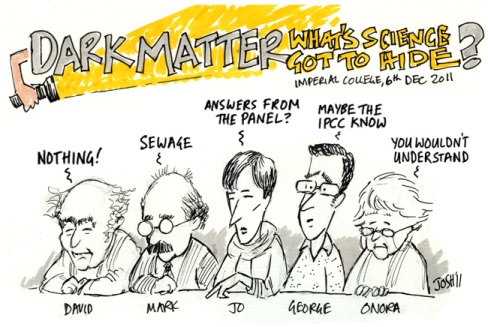What's science got to hide? Part II
| 14 December, 2011 | Adie Chan |
|

|
I mentioned last week that we would be attending the Index on Censorship data debate, at which Sir Mark Walport, George Monbiot, Baroness Onora O’Neill and David Colquhoun would be discussing whether transparency, Freedom of Information laws in particular, is bad for science.

The debate was certainly lively and interesting, with topics of discussion such as open data, peer review, and who should be given access to raw data. Index on Censorship has already summed up the discussion nicely, but we’ll share with you a few of our favourite snippets of conversation from the evening (in some cases, paraphrased for brevity):
Baroness O’Neill
- “Open data is reusable data. It’s important for science to allow competent others to check and challenge the data.”
- “The costs of sharing large datasets may be prohibitive. Who should bear these costs?”
- “There’s a difference between data and useful info. Scientists need to interpret data for the lay public.”
George Monbiot
- (in response to Baroness O’Neill): “Who decides who’s competent?”
- “The media, largely humanities graduates, consider the scientific community to be opaque and elitist.”
- “There are barriers between the public and science in the form of journal-subscription paywalls.”
- “Scientists could deal better with freedom of information requests – the worst thing they can do is to fight them and give the impression that science has something to hide.”
Sir Mark Walport
- “Science flourishes on openness.”
- “Raw data is like raw sewage; some nuggets in there, but harmful if misapplied.”
- “Information [i.e. masses of data] is sometimes confused with knowledge.”
- “Transparency takes away our competitive advantage.”
- “We need to balance the costs and benefits of making data sets available.”
David Colquhoun
- “FOI laws should be extended to cover private companies, without that, [FOI laws] become increasingly useless.”
- “It is mandatory to register clinical trials, but it isn’t mandatory to publish their results when the trials finish.”
- “The pressure to publish regardless of whether you have anything to say generates secrecy within the scientific community.”
Audience member
- “Should peer review be used to decide what data should be released as open data?”
And lastly, I’ll leave you with this, from Twitter, an indicator of the tensions of the debate:
GeorgeMonbiot: great #datadebate last night. But amazed by behaviour of Lady O’Neill. At 1 point I thought she was going to nut me.
You can view a video of the debate online.

|

